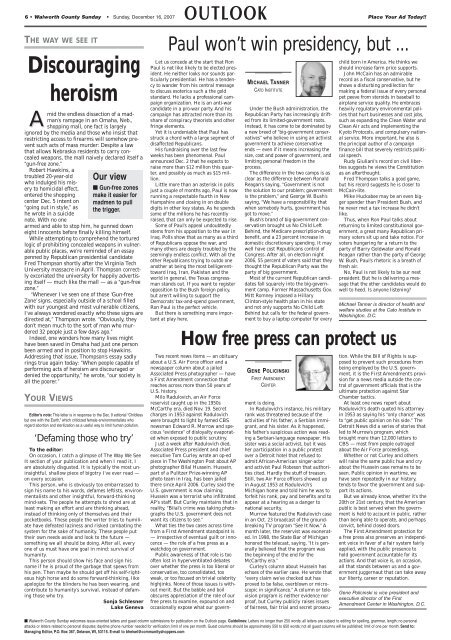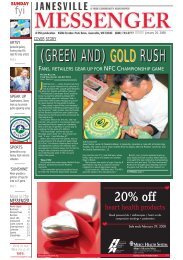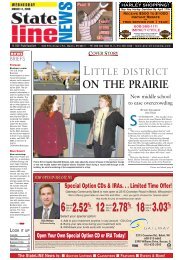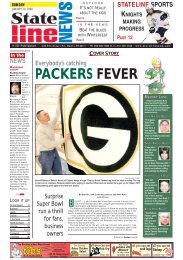You also want an ePaper? Increase the reach of your titles
YUMPU automatically turns print PDFs into web optimized ePapers that Google loves.
OUTLOOK<br />
6 Walworth County Sunday Sunday, December 16, 2007 Place Your Ad Today!!<br />
THE WAY WE SEE IT<br />
Discouraging<br />
YOUR VIEWS<br />
heroism<br />
A<br />
mid the endless dissection of a madman’s<br />
rampage in an Omaha, Neb.,<br />
shopping mall, one fact is largely<br />
ignored by the media and those who insist that<br />
restricting access to firearms will somehow prevent<br />
such acts of mass murder: Despite a law<br />
that allows Nebraska residents to carry concealed<br />
weapons, the mall naively declared itself a<br />
“gun-free zone.”<br />
Robert Hawkins, a<br />
troubled 20-year-old<br />
who indulged his misery<br />
to homicidal effect,<br />
entered the shopping<br />
center Dec. 5 intent on<br />
“going out in style,” as<br />
he wrote in a suicide<br />
note. With no one<br />
Our view<br />
■ Gun-free zones<br />
make it easier for<br />
madmen to pull<br />
the trigger.<br />
armed and able to stop him, he gunned down<br />
eight innocents before finally killing himself.<br />
While attempting to comprehend the tortured<br />
logic of prohibiting concealed weapons in vulnerable<br />
public places, we’re reminded of an essay<br />
penned by Republican presidential candidate<br />
Fred Thompson shortly after the Virginia Tech<br />
University massacre in April. Thompson correctly<br />
excoriated the university for happily advertising<br />
itself — much like the mall — as a “gun-free<br />
zone.”<br />
“Whenever I’ve seen one of those ‘Gun-free<br />
Zone’ signs, especially outside of a school filled<br />
with our youngest and most vulnerable citizens,<br />
I’ve always wondered exactly who these signs are<br />
directed at,” Thompson wrote. “Obviously, they<br />
don’t mean much to the sort of man who murdered<br />
32 people just a few days ago.”<br />
Indeed, one wonders how many lives might<br />
have been saved in Omaha had just one person<br />
been armed and in position to stop Hawkins.<br />
Addressing that issue, Thompson’s essay sadly<br />
rings true again today: “When people capable of<br />
performing acts of heroism are discouraged or<br />
denied the opportunity,” he wrote, “our society is<br />
all the poorer.”<br />
Editor’s note: This letter is in response to the Dec. 9 editorial “Childless<br />
but one with the Earth,” which criticized female environmentalists who<br />
regard abortion and sterilization as a useful way to limit human pollution.<br />
‘Defaming those who try’<br />
To the editor:<br />
On occasion, I catch a glimpse of The Way We See<br />
It section of your publication and when I read it, I<br />
am absolutely disgusted. It is typically the most uninsightful,<br />
shallow piece of bigotry I’ve ever read —<br />
on every occasion.<br />
This person, who is obviously too embarrassed to<br />
sign his name to his words, defames leftists, environmentalists<br />
and other insightful, forward-thinking<br />
mind-sets. The people he attempts to shred are at<br />
least making an effort and are thinking ahead,<br />
instead of thinking only of themselves and their<br />
pocketbooks. These people the writer tries to humiliate<br />
have defeated laziness and risked combating the<br />
system for the sake of humanity. These people put<br />
their own needs aside and look to the future —<br />
something we all should be doing. After all, every<br />
one of us must have one goal in mind: survival of<br />
humanity.<br />
This person should show his face and sign his<br />
name if he is proud of the garbage that spews from<br />
his pen. Then maybe he should get off his self-righteous<br />
high horse and do some forward-thinking, like<br />
apologize for the blinders he has been wearing, and<br />
contribute to humanity’s survival, instead of defaming<br />
those who try.<br />
Sonja Schlesner<br />
Lake Geneva<br />
Paul won’t win presidency, but ...<br />
Let us concede at the start that Ron<br />
Paul is not like likely to be elected president.<br />
He neither looks nor sounds particularly<br />
presidential. He has a tendency<br />
to wander from his central message<br />
to discuss esoterica such a the gold<br />
standard. He lacks a professional campaign<br />
organization. He is an anti-war<br />
candidate in a pro-war party. And his<br />
campaign has attracted more than its<br />
share of conspiracy theorists and other<br />
fringe elements.<br />
Yet it is undeniable that Paul has<br />
struck a chord with a large segment of<br />
disaffected Republicans.<br />
His fundraising over the last few<br />
weeks has been phenomenal. Paul<br />
announced Dec. 2 that he expects to<br />
raise more than $12 million this quarter,<br />
and possibly as much as $15 million.<br />
Little more than an asterisk in polls<br />
just a couple of months ago, Paul is now<br />
running a respectable fourth in New<br />
Hampshire and closing in on double<br />
digits in other key states. As he spends<br />
some of the millions he has recently<br />
raised, that can only be expected to rise.<br />
Some of Paul’s appeal undoubtedly<br />
stems from his opposition to the war in<br />
Iraq. Polls show that as many as a third<br />
of Republicans oppose the war, and<br />
many others are deeply troubled by the<br />
seemingly endless conflict. With all the<br />
other Republicans trying to outdo one<br />
another at being the most belligerenttoward<br />
Iraq, Iran, Pakistan and the<br />
world in general, the Texas congressman<br />
stands out. If you want to register<br />
opposition to the Bush foreign policy,<br />
but aren’t willing to support the<br />
Democrats’ tax-and-spend government,<br />
Ron Paul is the perfect vehicle.<br />
But there is something more important<br />
at play here.<br />
Under the Bush administration, the<br />
Republican Party has increasingly drifted<br />
from its limited-government roots.<br />
Instead, it has come to be dominated by<br />
a new breed of “big-government conservatives”<br />
who believe in using an activist<br />
government to achieve conservative<br />
ends — even if it means increasing the<br />
size, cost and power of government, and<br />
limiting personal freedom in the<br />
process.<br />
The difference in the two camps is as<br />
clear as the difference between Ronald<br />
Reagan’s saying, “Government is not<br />
the solution to our problem; government<br />
is the problem,” and George W. Bush’s<br />
saying, “We have a responsibility that<br />
when somebody hurts, government has<br />
got to move.”<br />
Bush’s brand of big-government conservatism<br />
brought us No Child Left<br />
Behind, the Medicare prescription-drug<br />
benefit, and a 23 percent increase in<br />
domestic discretionary spending. It may<br />
well have cost Republicans control of<br />
Congress. After all, on election night<br />
2006, 55 percent of voters said that they<br />
thought the Republican Party was the<br />
party of big government.<br />
Most of the current Republican candidates<br />
fall squarely into the big-government<br />
camp. Former Massachusetts Gov.<br />
Mitt Romney imposed a Hillary<br />
Clinton-style health plan in his state<br />
and not only supports No Child Left<br />
Behind but calls for the federal government<br />
to buy a laptop computer for every<br />
child born in America. He thinks we<br />
should increase farm price supports.<br />
John McCain has an admirable<br />
record as a fiscal conservative, but he<br />
shows a disturbing predilection for<br />
making a federal issue of every personal<br />
pet peeve from steroids in baseball to<br />
airplane service quality. He embraces<br />
heavily regulatory environmental policies<br />
that hurt businesses and cost jobs,<br />
such as expanding the Clean Water and<br />
Clean Air acts and implementing the<br />
Kyoto Protocols, and compulsory national<br />
service. More important, he also is<br />
the principal author of a campaign<br />
finance bill that severely restricts political<br />
speech.<br />
Rudy Giuliani's record on civil liberties<br />
suggests he views the Constitution<br />
as an afterthought.<br />
Fred Thompson talks a good game,<br />
but his record suggests he is closer to<br />
McCain-lite.<br />
Mike Huckabee may be an even bigger<br />
spender than President Bush, and<br />
he never met a tax increase he didn’t<br />
like.<br />
Thus, when Ron Paul talks about<br />
returning to limited constitutional government,<br />
a great many Republican primary<br />
voters sit up and take notice. For<br />
voters hungering for a return to the<br />
party of Barry Goldwater and Ronald<br />
Reagan rather than the party of George<br />
W. Bush, Paul’s rhetoric is a breath of<br />
fresh air.<br />
No, Paul is not likely to be our next<br />
president. But he is delivering a message<br />
that the other candidates would do<br />
well to heed. Is anyone listening?<br />
How free press can protect us<br />
Two recent news items — an obituary<br />
about a U.S. Air Force officer and a<br />
newspaper column about a jailed<br />
Associated Press photographer — have<br />
a First Amendment connection that<br />
reaches across more than 50 years of<br />
U.S. history.<br />
Milo Radulovich, an Air Force<br />
reservist caught up in the 1950s<br />
McCarthy era, died Nov. 19. Secret<br />
charges in 1953 against Radulovich<br />
were brought to light by famed CBS<br />
newsman Edward R. Morrow and specious<br />
“evidence” of disloyalty evaporated<br />
when exposed to public scrutiny.<br />
Just a week after Radulovich died,<br />
Associated Press president and chief<br />
executive Tom Curley wrote an op-ed<br />
piece in The Washington Post about AP<br />
photographer Bilal Hussein. Hussein,<br />
part of a Pulitzer Prize-winning AP<br />
photo team in Iraq, has been jailed<br />
there since April 2006. Curley said the<br />
U.S. government is now claiming<br />
Hussein was a terrorist who infiltrated<br />
AP’s staff. But Curley maintains that in<br />
reality, “Bilal’s crime was taking photographs<br />
the U.S. government does not<br />
want its citizens to see.”<br />
What ties the two cases across time<br />
from a First Amendment standpoint is<br />
— irrespective of eventual guilt or innocence<br />
— the role of a free press as a<br />
watchdog on government.<br />
Public awareness of that role is too<br />
often lost in hyperventilated debates<br />
over whether the press is too liberal or<br />
conservative, too consolidated, too<br />
weak, or too focused on trivial celebrity<br />
highjinks. None of those issues is without<br />
merit. But the babble and boil<br />
obscures appreciation of the role of our<br />
free press to examine, expound on and<br />
occasionally expose what our govern-<br />
MICHAEL ICHAEL TANNER ANNER<br />
CATO INSTITUTE<br />
GENE ENE POLICINSKI OLICINSKI<br />
FIRST AMENDMENT<br />
ment is doing.<br />
In Radulovich’s instance, his military<br />
rank was threatened because of the<br />
activities of his father, a Serbian immigrant,<br />
and his sister. As it happened,<br />
his father’s suspicious action was reading<br />
a Serbian-language newspaper. His<br />
sister was a social activist, but it was<br />
her participation in a public protest<br />
over a Detroit hotel that refused to<br />
admit African-American singer-actor<br />
and activist Paul Robeson that authorities<br />
cited. Hardly the stuff of treason.<br />
Still, two Air Force officers showed up<br />
in August 1953 at Radulovich’s<br />
Michigan home and told him he was to<br />
forfeit his rank, pay and benefits and to<br />
appear at a hearing as a danger to<br />
national security.<br />
Murrow featured the Radulovich case<br />
in an Oct. 23 broadcast of the groundbreaking<br />
TV program “See It Now.” A<br />
month later, the reservist was exonerated.<br />
In 1998, the State Bar of Michigan<br />
honored the telecast, saying, “It is generally<br />
believed that the program was<br />
the beginning of the end for the<br />
McCarthy era.”<br />
Curley’s column about Hussein has<br />
echoes of the earlier case. He wrote that<br />
“every claim we’ve checked out has<br />
proved to be false, overblown or microscopic<br />
in significance.” A column or television<br />
program is neither evidence nor<br />
proof, but Curley publicly raises issues<br />
of fairness, fair trial and secret prosecu-<br />
tion. While the Bill of Rights is supposed<br />
to prevent such procedures from<br />
being employed by the U.S. government,<br />
it is the First Amendment’s provision<br />
for a news media outside the control<br />
of government officials that is the<br />
ultimate protection against Star<br />
Chamber tactics.<br />
At least one news report about<br />
Radulovich’s death quoted his attorney<br />
in 1953 as saying his “only chance” was<br />
to “get public opinion on his side.” The<br />
Detroit News did a series of stories that<br />
led to Murrow’s program, which<br />
brought more than 12,000 letters to<br />
CBS — most from people outraged<br />
about the Air Force proceedings.<br />
Whether or not Curley and others<br />
will raise the same public hue and cry<br />
about the Hussein case remains to be<br />
seen. Public opinion in wartime, we<br />
have seen repeatedly in our history,<br />
tends to favor the government and support<br />
its actions.<br />
But we already know, whether it’s the<br />
20th or 21st century, that the American<br />
public is best served when the government<br />
is held to account in public, rather<br />
than being able to operate, and perhaps<br />
convict, behind closed doors.<br />
The First Amendment protection for<br />
a free press also preserves an independent<br />
voice in favor of a fair system fairly<br />
applied, with the public presence to<br />
hold government accountable for its<br />
actions. And that voice is, on occasion,<br />
all that stands between us and a government<br />
juggernaut that can take away<br />
our liberty, career or reputation.<br />
■ Walworth County Sunday welcomes issue-oriented letters and guest column submissions for publication on the Outlook page. Guidelines: Letters no longer than 250 words; all letters are subject to editing for spelling, grammar, length; no personal<br />
attacks or letters related to personal disputes; daytime phone number needed for verification; limit of one per month. Guest columns should be approximately 550 to 650 words; not all guest columns will be published; limit of one per month. Send to:<br />
Managing Editor, P.O. Box 367, Delavan, WI, 53115. E-mail to bheisel@communityshoppers.com<br />
CENTER<br />
Michael Tanner is director of health and<br />
welfare studies at the Cato Institute in<br />
Washington, D.C.<br />
Gene Policinski is vice president and<br />
executive director of the First<br />
Amendment Center in Washington, D.C.
















